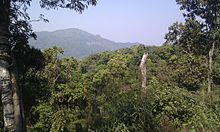Euryplatea nanaknihali

| Euryplatea nanaknihali | |
|---|---|
 | |
| Scientific classification | |
| Kingdom: | |
| Phylum: | |
| Class: | |
| Order: | |
| Family: | |
| Genus: | |
| Species: | E. nanaknihali |
| Binomial name | |
| Euryplatea nanaknihali Brown, 2012 | |
Euryplatea nanaknihali is the world's smallest fly, measuring 0.4 millimetres (0.016 in) in size.[1]
Due to its small size, the viscosity of air is problematic for the insect, and even the smallest air currents are a large impediment. Scientists expressed amazement that such a tiny animal could still have all the organs of a normal insect.[2]

They are believed to lay their eggs in the heads of small Crematogaster ants. The larva consumes the interior of the ant's head, within whose exoskeleton it pupates, before emerging as an adult.[2][3]

The species has been found in a number of national parks in Thailand. It is named after Nanak Nihal Weiss, a boy interested in insects who frequented the Natural History Museum of Los Angeles County with his father.[4]
References
[edit]- ^ Brown, B.V. 2012: Small size no protection for acrobat ants: world's smallest fly is a parasitic phorid (Diptera: Phoridae). Annals of the Entomological Society of America, 105(4): 550-554. doi:10.1603/AN12011
- ^ a b Chelsea Whyte (July 2, 2012). "World's Smallest Fly Decapitates Ants and Lives in Their Severed Heads". International Science Times. Archived from the original on January 4, 2014. Retrieved July 20, 2012.
- ^ "World's smallest fly discovered in Thailand". ScienceBlogs. July 3, 2012. Archived from the original on January 4, 2014. Retrieved January 4, 2014.
- ^ Black, Debra (July 9, 2012). "World's tiniest fly discovered by former Torontonian". Toronto Star. Archived from the original on January 4, 2014. Retrieved January 4, 2014.